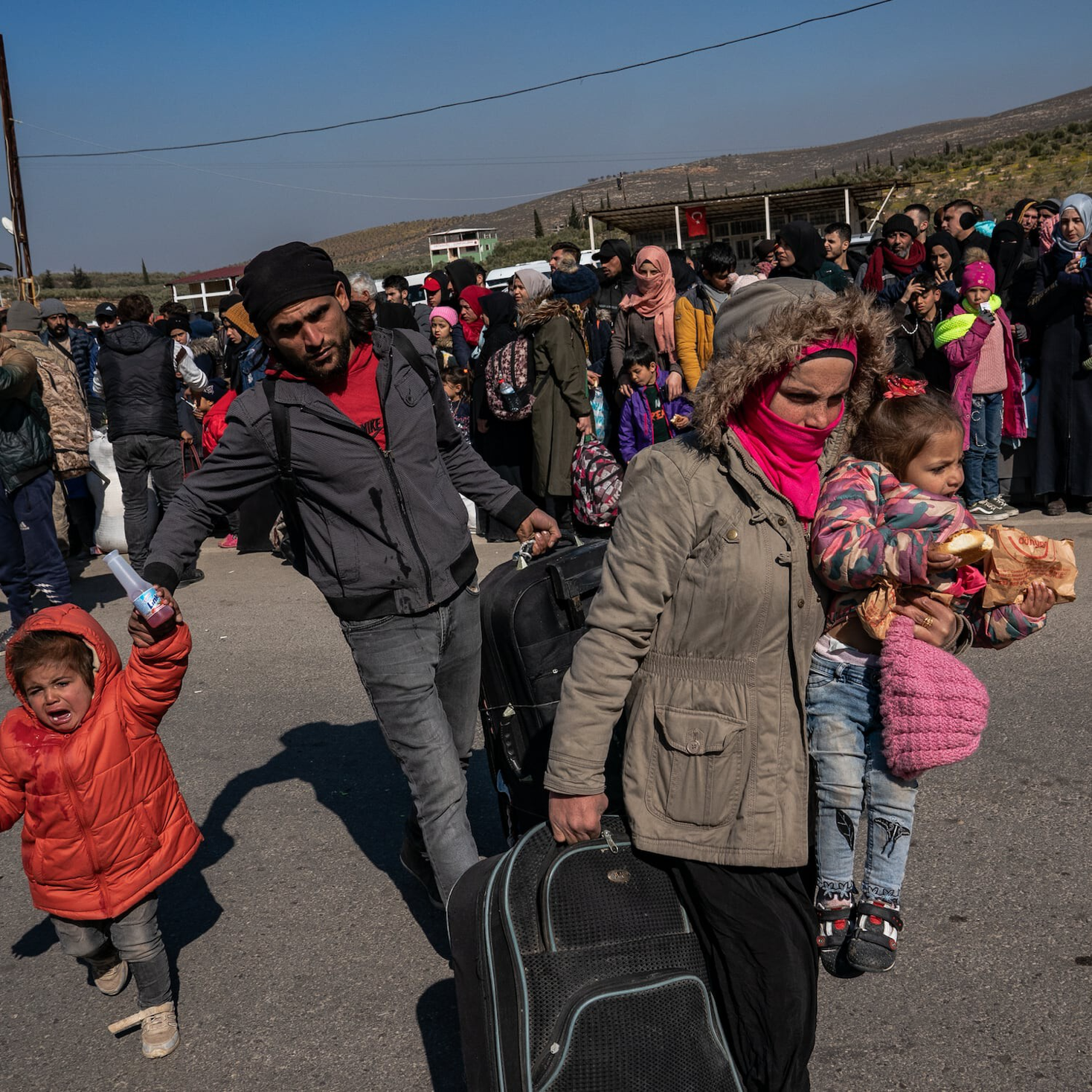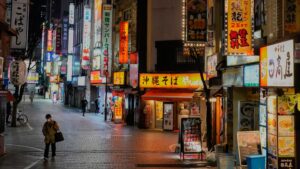KAHRAMANMARAS, Turkey — As Turkish rescue teams combed slowly through a gray mountain of broken concrete Wednesday night, a group of Syrians looked on, arms crossed, faces set in hard expressions.
Back in Syria, where such scenes are common after more than a decade of war, rescuers usually dive right in, without proper equipment, often at great personal risk. “They would’ve cleared it in two days,” muttered one young man. His relatives grunted in agreement, huddled over an open fire as they waited to learn the fate of their missing family members.
Many Syrians in the ravaged Turkish city of Kahramanmaras have already lived through years of aerial bombardment and untold loss. But even for them, the scale of the destruction after the Feb. 6 earthquakes is impossible to process. The temblors leveled whole apartment complexes and killed more than 43,000 people. Already displaced from their country, already accustomed to discrimination in Turkey, Syrians now face new trauma and insecurity, and are left to wrestle with a painfully familiar question: Where to now?
Turkey is home to at least 4 million refugees and asylum seekers from Syria who have fled conflict, hardship and government repression, and many of them are concentrated across the southern quake zone. Anti-Syrian sentiment has flared time and again over the years, fanned by nativist politicians who see their former neighbors as convenient scapegoats for Turkey’s problems, including its recent economic downturn. Now, Syrians are blamed for taking up scarce resources at a time of national tragedy.
“We ended up in the street,” said Abu Hussein, a man from Aleppo who has been living in Kahramanmaras for 10 years. “Even before the earthquake, [Syrians] were nearly on the streets.”
The father of five spoke from a small patch of land dotted with a handful of tents that now house his extended family and their Turkish neighbors. His son Hussein said he and his brother had registered days ago with AFAD, Turkey’s disaster management agency, for two more tents to house the three families.
“Every time I go, they tell me to go to the mayor. When I go to the mayor, he tells me he didn’t receive anything. I go back to AFAD and they tell me the mayor has them,” he said, adding that he saw Turks receive tents but was yelled at when he pointed it out to one of the staff.
“They tell us: Syrians, step aside,” his brother-in-law Ahmed added. “In another place, I overheard someone say, ‘This tent has Syrians — empty it and put Turks inside.’”
The family members, who spoke on the condition they be identified only by their first names to avoid harassment, repeated a point made by many of the more than a dozen Syrians interviewed for this article: Unlike them, Turks are not used to catastrophe.
“They’re distressed, and this is the first time something like this has happened to them,” said Mushira, Abu Hussein’s daughter. “We’re acclimated: We were displaced from Syria and forced to come here. We got used to the situation. But they’re finding it difficult.”
Mushira described standing in line for clothes two days earlier when a Turkish woman became agitated. “She yelled, ‘You people take everything for yourselves,’” Mushira said. “I lost my temper. I threw the bag on the ground and said, ‘Here.’”
“We got used to it,” she said simply. “We got used to everything: to displacement, to injustice, to insult.”
There were other stories they wanted to tell, though, of Turkish kindness and generosity: the landlord who tried to reach them to make sure they were all right; their sweet elderly neighbor living in the tent next door; the volunteers who bring cookies and diapers for the children.
Turkish President Recep Tayyip Erdogan has promised rental assistance to those made homeless by the quakes, saying the government will give out 15,000 Turkish lira, nearly $800, to each family. But Syrians do not expect they will be included.
In a refugee camp outside the city, where conditions were already difficult before the quakes, two women told The Washington Post their living quarters are now overflowing with relatives and acquaintances; trailers meant for one family are sleeping three, with people crammed against one another each night. “Sometimes you see people standing outside, just to breathe,” said Um Mahmoud.
On the other side of the camp, new trailers were brought in to house displaced Turks. When Syrians with Turkish passports showed up to get aid, they said, they were kicked out by officers who heard them speaking Arabic. “Syrians are keeping to themselves out of worry,” Um Mahmoud’s friend confided.
For many who came to Turkey in search of a new start, there is no longer any reason to stay. Since Wednesday, at least 4,000 Syrians have gathered at Turkey’s Bab al-Hawa border crossing, their remaining possessions stuffed into sacks, waiting to return to their homeland. Some were going back to check on family members who had been out of contact since the quakes; others, to answer relatives’ pleas that they come home. Some of the men planned to scope out the situation alone, wary of bringing their wives or children until they knew what life was like across the border.
After a years-long closure, border authorities say those who make the crossing will have three to six months to return to Turkey. But many in the crowd were unsure if that was a promise they could trust.
“They’re using the term ‘holiday.’ We hope it’s a holiday,” said a 50-year-old day laborer who gave his name as Abu Anas. His family had lived in Antakya, but their home was destroyed along with much of the Turkish city. He had no tent. His brother-in-law was dead. His nephews and nieces had already been sent back to Syria with serious injuries.
His family didn’t know what they would do exactly when they entered Syria. But they at least had a destination — the Atmeh displacement camp, where they believed the man’s mother was living, although he had not heard from her for two months. “I’m not bringing much, just the clothes on my back,” he said. “I just want to see her. Ten days with her would mean as much as 10 years now.”
The most popular and interesting stories of the day to keep you in the know. In your inbox, every day.
None of the Syrians interviewed at the border said they had contemplated returning before the earthquake, which shattered the fragile lives they had built in Turkey. Many were not even going back to their hometowns, still controlled by the same forces they had fled, and were instead planning to stay in the rebel-held northwest, where millions of other displaced Syrians have already sought refuge.
While international aid has flooded Turkey’s disaster zone, there has been only a trickle in Syrian areas outside government control. The United Nations spent almost a week negotiating access for its trucks; even then, only several dozen have made it through. Most of the limited relief efforts are carried out through local groups or with Turkish support.
“There’s nothing for us there, but now there’s nothing for us here,” said Ahmed Soleiman, as he looked down at the bags his family had packed for the road. A rolled-up rug and blankets. Some bags of clothes. “It’s all we could rescue,” he said. “That’s all we have.”
In a city along Turkey’s coast, a Syrian volunteer was helping parcel out aid with a Syrian nongovernmental organization this week when a Turkish intelligence officer visited the warehouse to check their paperwork.
“He started telling me, ‘Syrians in Hatay are looting from corpses and cutting off people’s hands’” to steal their belongings, she told The Post, speaking on the condition of anonymity for fear of retribution. “I told him … ‘We’re not all bad people.’”
The officer grabbed her arm and almost struck her after she called the police, who eventually arrived and calmed the situation, she said. The incident left her deeply shaken.
“It’s clear: They don’t want us,” she said.
But in Kahramanmaras, in a soccer field turned displacement camp surrounded by tilting buildings and piles of rubble, homeless Syrians and Turks live side by side, standing in line for the same stew and rice, sleeping in identical tents.
“Their own countrymen have priority of course,” said Walid, a middle-aged Syrian man.
“Their president offered them housing; our president laughed over the corpses of his people,” his friend Mohammed remarked, referring to Syria’s President Bashar al-Assad, adding that the Turkish response gave him hope.
Still, for everyone, there is the question of what to do next.
“We have nothing to lose,” said Maher Qasmo, a 43-year-old father who had come to Turkey from Hama. His wife continued his thought: “Because our real homes are gone. My house where I lived with my husband, where I had my dowry furniture and on which I spent years, in Syria, was flattened,” she said. “We got displaced here, were tormented and worked hard and rented a place and fixed it up. Now it’s gone. It’s become normal for us.”
She lost her aunt and uncle in the earthquakes, and doesn’t know if she can go back to the house to retrieve any of their belongings. She’s grateful, though, that Turkish authorities gave them a tent and a heater to weather the cold.
As she speaks, she rocks her daughter Fatima, a 5-year-old wrapped in a blanket stamped with the logo of Saudi Arabia’s relief agency, a relic of a previous displacement. Hearing her mother speak, Fatima whispers that they will go back to the only house she knows — their house in Turkey. “It’s just a little broken,” she said to her mother, who nodded back and smiled.
“It’s just a little broken,” her mother repeated.
Loveluck reported from the Bab al-Hawa border crossing
Sarah Dadouch is a Beirut-based Middle East correspondent for The Washington Post. She was previously a Reuters correspondent in Beirut, Riyadh and Istanbul.
Louisa Loveluck is the Baghdad bureau chief. She was previously based in Beirut for the Post and worked as the Cairo correspondent for the Daily Telegraph.




